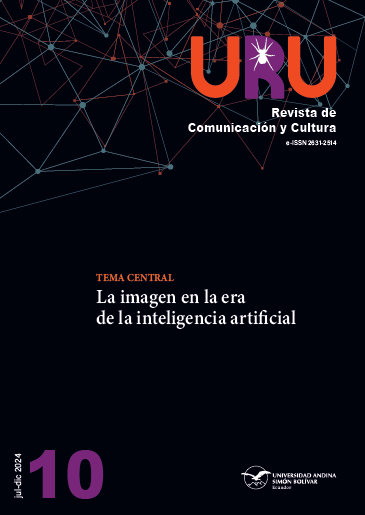Artificial Intelligence, a Tool for Previewing Immersive Scripts
DOI:
https://doi.org/10.32719/26312514.2024.10.7Keywords:
Artificial intelligence, immersive scripts, storyboards, orality, narratives, virtual reality, prompts, interactionAbstract
The integration of artificial intelligence (AI) in the creation of immersive scripts for virtual reality projects poses a convergence between human narrative and advanced technology. This synergy, by combining oral storytelling with AI algorithms, facilitates the dynamic generation of narrative content adaptable to the project’s needs. However, this technological progress is not without ethical dilemmas. A debate arises about the autonomy of AI and its influence on artistic originality, questioning the authenticity of the generated works. In this context, the storyboard undergoes a transformation through collaboration with programming experts, with the purpose of adapting it to virtual reality. This adaptation is considered an imperative measure in the execution of the “When Silence Talks” project, despite its initial conception by artificial intelligence systems. Furthermore, responsibility and transparency in the creative process become crucial, as artificial intelligence makes decisions that affect the narrative and generated content. It is essential to establish ethical practices and clear regulations guiding the responsible use of artificial intelligence in script creation, ensuring diversity and equity in representation. This multidisciplinary approach requires close collaboration among creators, psychologists, developers, and ethics experts, aiming to mitigate the risks of biases and discrimination in the produced narratives. Ultimately, if these ethical challenges are properly addressed, the integration of AI in the creation of immersive scripts could significantly enrich digital narrative and its ability to explore complex social issues.
Downloads
References
Freire, Pablo. 2000. Pedagogía del oprimido. Madrid: Siglo XXI.
Heiden, Wolfgang, y Eric Fassbender. 2010. “An Edutainment Approach to Academic Teaching Based on Storytelling”. En CSEDU 2010: Proceedings of the Second International Conference on Computer Supported Education. Vol. 2, editado por José Moinhos, Boris Shishkov, Alexander Verbraeck y Markus Helfert, 126-31. Valencia: CSEDU.
Morgan, David. 1998. The Focus Group Guidebook. Londres: Sage. DOI: https://doi.org/10.4135/9781483328164
Morillas, Esther. 2016. “Oralidad y narración: Un estudio de caso”. MonTI. Monografías de Traducción e Interpretación, núm. esp. 3: 55-75. https://doi.org/10.6035/MONTI.2016.NE3.2. DOI: https://doi.org/10.6035/MonTI.2016.ne3.2
Sobrinho, Evaldo, y Cristina Jasbinschek. 2013. “Realidade virtual: Articulações com os estudos da linguagem”. Interdisciplinar. Revista de Estudos en Língua e Literatura 19 (2). https://tinyurl.com/259b8xt6.
Published
How to Cite
Issue
Section
License
Copyright (c) 2024 Uru: Revista de Comunicación y Cultura

This work is licensed under a Creative Commons Attribution-NonCommercial-ShareAlike 4.0 International License.
ASSIGNMENT OF RIGHTS, DECLARATION OF CONFLICT OF INTEREST AND DISSEMINATION
The authors who publish in this journal accept the following conditions:
- Authors retain copyright and grant the journal the right of first publication, with the work registered under the Creative Commons Attribution-NonCommercial-ShareAlike 4.0 License, which allows sharing, adapting and attributing the work (see: Open Access Policies).
- Authors can make other independent and additional contractual agreements for the distribution of the article published in this journal (e.g., include it in an institutional repository or publish it in a book) as long as they expressly indicate that the article was published for the first time in Uru: Revista de Comunicación y Cultura. In the case of reproduction, a note similar to the following must be included: This text was originally published in the journal Uru: Revista de Comunicación y Cultura N ° -, year of publication.
- Authors are encouraged to publish their work on the Internet (e.g. on institutional or personal pages) in the final version published by Uru: Revista de Comunicaicón y Cultura as it may lead to a wider and faster dissemination of the published work.








